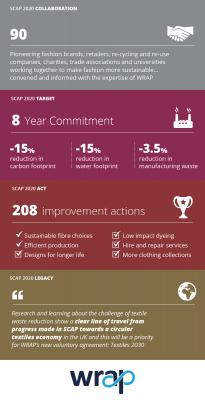- The carbon target was exceeded with a reduction of -15.9%.
- The water target was exceeded with a -19.5% reduction.
- The waste target recorded a -2.3% reduction against a -3.5% target.
This report for the period 2012 – 2019 outlines how WRAP’s pioneering industry led action plan has delivered positive environmental and economic outcomes for UK fashion and textiles organisations - Over 90 organisations, including brands & retailers representing more than 48% of UK clothing sales volume.
It highlights examples of best practice, describes the impact of some of the signatory actions, and the SCAP legacy.
Finally, it considers how to take the learning from SCAP forward into the 2020s and the next steps for UK fashion and textiles. This is a high-level summary report of SCAP progress to date – the full technical data report is available here.

Signatory Impact
ASOS – achieved 14% organic cotton in 2019, with more than 80% of cotton now more sustainably sourced.

Tesco – through F&F, switched fabrics to more sustainable options: from virgin to recycled polyester and recycled nylon, viscose to lyocell, and conventional cotton to Better Cotton Initiative (BCI) or organic cotton.

M&S – has been working on the adoption of more sustainable materials and dyeing processes in clothing and home products. Since 2012, it has demonstrated more than 29% reduction in water and over 11% reduction in carbon. Reaching 100% more sustainable cotton throughout its clothing ranges was a key driver.

Primark – significantly reduced its environmental impacts through the expansion of the Primark Sustainable Cotton Program, which uses Cotton Connect’s REEL methodology.

Salvation Army Trading – has nearly doubled the quantity of second-hand clothing collected each year at recycling banks from its large supermarket customers and charity shops. It now collects around 50,000 tonnes of clothing, textiles and other items each year.
Whistles – switching to BCI cotton contributed to a reduction of over 70% in water footprint.
What's next
The UK Textiles Pact (formerly Textiles 2030) is WRAP’s new ground-breaking, expert-led initiative, harnessing the knowledge and expertise of UK leaders in sustainability to accelerate the whole industry’s move towards circularity and system change in the UK.
With an official launch in April 2021, the new voluntary agreement builds on the learning and success of the Sustainable Clothing Action Plan and aims to engage the majority of UK fashion and textiles organisations in collaborative action:
- Experienced sustainability leaders, recycling and re-use organisations and SCAP signatories will collaborate as ‘Partners’ on fast-tracking the UK Circular Economy
- Other fashion and textiles Brands and Retailers can sign up as ‘Member’ signatories and benefit from WRAP’s support in achieving a ready-made, science-based, robust climate strategy and measuring their GHG emissions
- Innovators, Ground-breakers, Researchers, Academics and Industry membership groups can join as Affiliates to contribute their expertise
To find out more
Download files
-

SCAP 2020: Progress report 2012-2019
PDF, 7.73 MB
-

SCAP 2020: Technical report
PDF, 1.09 MB
By downloading resources you are agreeing to use them according to our terms and conditions.
These files may not be suitable for users of assistive technology.
